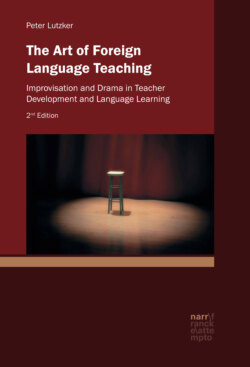Читать книгу The Art of Foreign Language Teaching - Peter Lutzker - Страница 41
На сайте Литреса книга снята с продажи.
3.2 Forms and Principles of the Drama Workshops
ОглавлениеThe following drama workshops have been regularly offered in the English Week:
Literature in Performance
Clowning
Drama and Creative Speech
Storytelling
Drama and Improvisation
Drama and Presence 194
The first three of these courses have been mainstays of the English Week and have been offered every year by the same course leaders. The others have varied more and in some cases are recent additions. Generally, 6–9 artistic groups are offered, depending on the amount of participants we have or expect to have at the conference. We have always attempted to establish a limit of 20 participants for each artistic group and generally manage to have groups of about 12–15. The participants submit 1st and 2nd choices with their registration and we try to balance out the different groups as evenly as possible. The length of the morning workshops is three hours.
One of the guiding principles behind the drama workshops has been their professionalization. While recognizing that there are many teachers with much dramatic experience and talent, we have nevertheless drawn clear distinctions between the quality of work possible with capable amateurs, compared to highly trained professionals. Although there is no doubt that dramatic work with experienced teachers can also lead to meaningful experiences, it has been our conviction that the dimensions of artistic experience which outstanding professional actors, clowns, storytellers etc. can offer teachers are, in the end, fundamentally different, and we consider this distinction to be significant. The two exceptions we have made have been in the form of courses offered by teachers with substantial drama experience who have offered workshops on how to work on drama with pupils. (All the other elements and activities on the program including lectures, methodology workshops, choir work etc. are led by experienced teachers and teacher trainers who are obviously the professionals in these areas.)
Although there are different emphases in each course, there are also many common dimensions and, in fact, there are elements in each of these workshops which are remarkably similar. What all courses offer is the possibility to enter into an intensive artistic process which at different points generally require a letting go of fears, inhibitions and preconceptions in order to create something new – whether in the recitation of a poem, the telling of a story, in acting a scene, or in a clowning improvisation.
It lies in the very nature of such challenges that they are invariably complex and highly personal processes entailing a wide range of difficulties. Thus, the structures of each of these groups are similar insofar as there is always extensive and careful preliminary work in the context of a wide range of warm-up exercises, all designed to foster later steps. In this warm-up phase there is a strong physical/physiological element present with much walking, running and a wide variety of exercises and games requiring physical movement. As each group is dependent on establishing a high degree of trust and openness among the participants, most of whom do not know each other, there is also a strong emphasis placed on creating an atmosphere of warmth, humour and trust. The course leaders do this in a variety of ways through their choice of exercises and material, but also in their entire manner of speaking to and working with the group. It is a tribute to their expertise and experience that they generally appear to be able to establish this degree of rapport within the first session.195
In order to give a more concrete picture of the kinds of artistic/dramatic work done at the English Week, it will be necessary to look more closely at what occurs in the course of a week’s workshop. Before examining the clowning workshop and the research on the effects of the clowning course, it will be instructive to look in more detail at another course in order to give a more complete picture of the general principles underlying all the artistic work for language teachers, as well as to be able to draw essential parallels and distinctions between clowning and the other drama workshops.
In this context, the course Literature in Performance can be seen to evidence both similarities and equally apparent differences. A further reason for choosing to examine this course is that Robert McNeer has written more extensively about his work than the other course leaders, thus making it possible to examine his approach in more detail.
